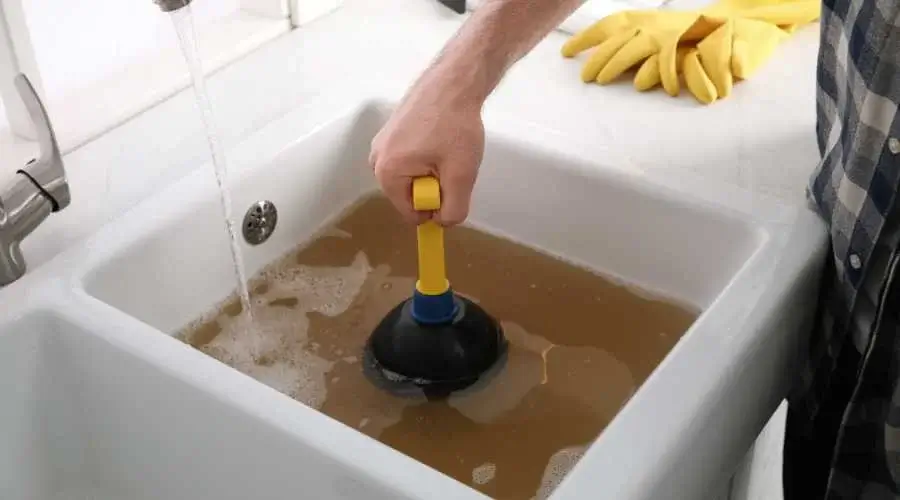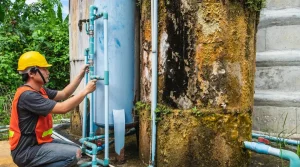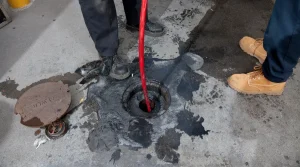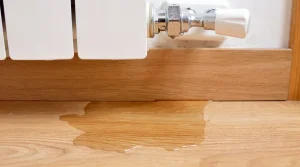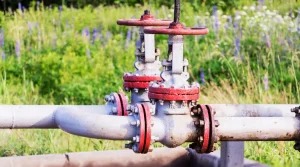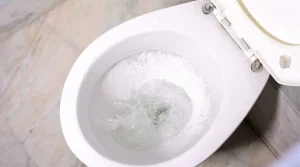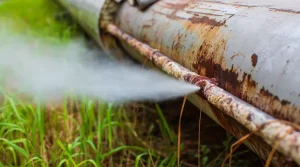A well-maintained plumbing system is essential for your business’s success. Proactive maintenance and swift repairs ensure smooth operations and prevent costly disruptions.
Key Takeaways:
- Preventative Maintenance Saves Money: Regular inspections and upkeep lower the possibility of costly repairs and damage.
- Common Issues: Commercial plumbing systems expect to have clogged drains, leaky pipes, and fluctuating water temperatures.
- Call in the Pros: DIY fixes may worsen issues; professional plumbers provide lasting solutions.
7 Common Commercial Plumbing Issues
1. Clogged Drains
Commercial drains handle far more waste than residential ones, especially in high-traffic facilities like restaurants, hotels, or hospitals. Over time, food particles, grease, and debris accumulate, causing backups. Regular maintenance or installing grease traps can prevent costly drain clogs, ensuring smooth operation in busy spaces.
2. Leaky Pipes
Leaks can occur anywhere due to aging pipes or high water pressure. In commercial buildings, these leaks often go undetected until water damage or mold becomes evident. Routine inspections by licensed plumbers can identify and repair leaks early, preventing extensive damage to your facility’s walls, ceilings, and even structural elements.
3. Water Temperature Regulation
Maintaining consistent water temperatures in commercial settings is crucial, especially for businesses that require hot water, like restaurants or spas. Due to their increased workload, commercial water heaters work harder and are more susceptible to failure. Inconsistent water temperatures may indicate problems with the water heater or extensive plumbing lines, and It’s criit’stical to deal with them right away to prevent more complications.
4. Odors
Unpleasant odors from drains or plumbing fixtures can be a significant deterrent for clients and employees. These smells often arise from sewer line clogs or malfunctioning valves, allowing sewer gases to escape the building. Ignoring odors can lead to health issues, as these gases may carry bacteria harmful to respiratory health. Routine maintenance, which guarantees a welcoming environment, may avoid these problems.
5. Poor Water Pressure
Low water pressure often indicates a leak or blockage within the plumbing system. If your facility relies on adequate water pressure for daily operations, resolving this issue promptly is critical. A commercial plumber can diagnose the root cause and address any leaks or obstructions that may compromise water flow.
6. Leaking Faucets
Leaking faucets might seem minor, but water wastage can add up in a commercial setting with numerous faucets, leading to significant costs. Addressing leaks promptly helps reduce your water bill and contributes to sustainable water usage. Regular inspections of faucets and fixtures are recommended to catch any issues before they become more significant.
7. Running Toilets
A worn-out or misaligned flapper frequently causes a toilet to run constantly. This minor issue can lead to extensive water wastage, impacting water bills. The cumulative effect can be substantial in a commercial facility with multiple bathrooms. A skilled plumber can replace or fix issues with faulty components, saving water and reducing costs.
FAQs on Common Commercial Plumbing Issues
Q: How often should I have my commercial plumbing system inspected?
A: It’s advisable to have a professional inspection every six months to a year. This makes it easier to see such problems early and guarantees smooth operations. High-traffic establishments may need more frequent checks.
Q: How can I prevent clogs in high-use areas like restaurant kitchens?
A: Installing grease traps and using strainers in sinks can catch food particles and grease before they enter the drains. Regular professional cleaning of these traps and drain lines also helps avoid clogs.
Q: How can I tell if a leaky pipe is behind my walls?
A: Look for water stains on walls or ceilings, damp spots, and mold growth. Musty odors can also indicate hidden leaks. If you suspect a leak, contact a plumber for a thorough inspection.
Q: Why does my commercial facility have inconsistent water temperatures?
A: This could be due to water heater strain, sediment build-up, or issues with long plumbing lines. A commercial plumber can inspect the system to identify and address these issues.
Q: Can unpleasant odors affect customer satisfaction?
A: Absolutely. Foul smells can deter customers and impact employee morale. Odors often indicate a severe plumbing issue, so address them immediately with a professional plumber.
Q: What causes low water pressure in commercial buildings?
A: Low water pressure can be caused by blockages, leaks, or an issue with the water supply line. Have a plumber investigate, as the cause may vary depending on your specific plumbing layout.
Q: How do I know if a running toilet affects my water bill?
A: A running toilet can waste hundreds of gallons daily. If you notice higher-than-normal water bills or hear toilets running frequently, it’s time to have them checked by a plumber.
Resolving Commercial Plumbing Problems for Your North Bergen Business
Addressing plumbing issues promptly can prevent disruptions and maintain a positive customer and staff experience. While DIY methods might offer temporary relief, they often fail to provide long-term solutions, which could lead to further complications.
For reliable service, contact BJC Plumbers North Bergen. Our team specializes in commercial plumbing repairs, leak detection, and trenchless solutions, ensuring minimal disruption to your operations. Proactive maintenance and quick responses can help you avoid costly repairs. Contact us today to schedule an inspection or learn how we can help your business run smoothly.

